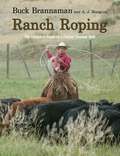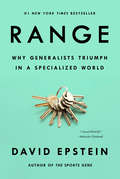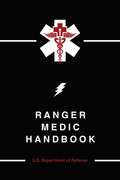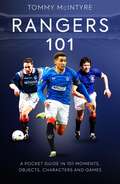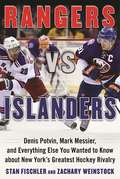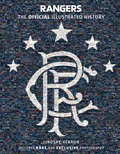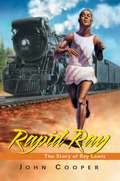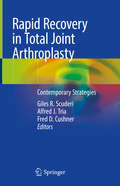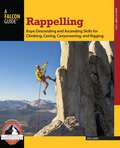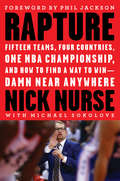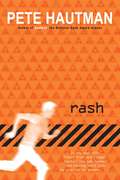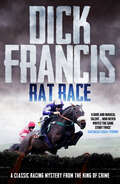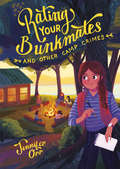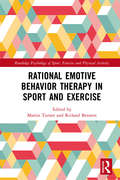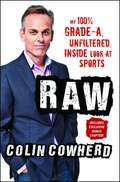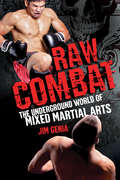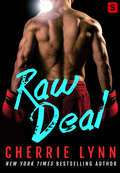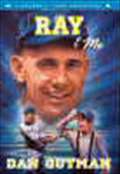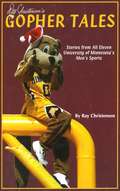- Table View
- List View
Ranch Roping: The Complete Guide To A Classic Cowboy Skill
by Buck Brannaman A. J. MangumRanch roping is at the heart of all ranch work, and unlike the rodeo variation of calf roping, the &“vacquero&” tradition calls for techniques that result in a skillful and graceful throw and catch. Buck Brannaman, a world-renowned master of the art, describes the essential tools, the partnership between horse and rider (incorporating the Natural Horsemanship approach for which the author is famous), and the mechanics needed to become a successful ranch roper, whether in competition or in actual cattle work.One-hundred full-color photographs of Buck in action enhance the step-by-step methodology that leads to mastering this essential Western skill. Whether you ride or rope or just wish you could, here&’s a book for everyone who is captivated by Western traditions and contemporary life.
Randi Goes for the Gold! (Silver Blades Super Special, #2)
by Effin OlderRandi is so excited! The Figure Eights are competing against the Junior Blade Runners in the mini-Olympics. Randi is sure her short program is good enough to win a medal. But only one member from each team can participate in a given event. Anna gets to skate her short program. Randi is assigned to the Bunny Hop-O-Rama. She can't believe it--what a lame event. She'll have to do something extra special to make herself stand out in front of the judges. Randi is determined to go for the gold!
Randi's Missing Skates (Silver Blades Figure Eights, #7)
by Effin OlderRandi really wants to win the first-ever competition of skating. She hopes the ice skates her big sister Jill gave her will bring good luck. But when Randi opens her cubby at school one day, she notices her skates are missing!
Randi's Pet Surprise (Silver Blades Figure Eights, #8)
by Effin OlderRandi and her pals in Figure Eights are gearing up for the big skate-a-thon to benefit the Best Buddies animal shelter. What a great cause! They even get to take a field trip to visit the shelter. But Mrs. Wong warns Randi before she leaves, "Don't bring home any pets." Their family is too busy to give an animal the attention it needs. On the way home from the shelter, Randi realizes a kitten has stowed away inside her backpack. She really wants to keep the kitten. She'll have to find a way to convince her mom she's responsible enough to have a pet. It won't be easy!
Randy and the Great Canoe Race (Girl Talk #41)
by L. E. Blair[From The Back Cover] What do you do when you've made a bet before you know you can win? Randy's done it again! Now she's gone and challenged Greg Loggins and his friends to a canoe race. It's the girls against the guys. Soon the entire population of Bradley Junior High is taking bets on which team will win. Randy, Katie, Sabrina, and Allison have even made a few bets of their own--like which one of them will be the first to learn how to even paddle a canoe. Once you get to know Sabrina, Allison, Katie and Randy you'll want to get in on all of their girl talk. There are over 30 more books in the Girl Talk series in the Bookshare Collection so you can start from the beginning with book #1, Welcome to Junior High, and continue with: #2 Face Off!, #3 The New You, #4 Rebel Rebel, #5 It's All in the Stars, #6 The Ghost of Eagle Mountain, #7 Odd Couple, #8 Stealing The Show, #9 Peer Pressure, #10 Falling in Like, #11 Mixed Feelings, #12 Drummer Girl, #13 The Winning Team, #14 Earth Alert!, #15 On The Air, #16 Here Comes The Bride, #17 Star Quality, #18 Keeping The Beat, #19 Family Affair, #20 Rockin' Class Trip, #21 Baby Talk, #22 Problem Dad, #23 House Party, #24 Cousins, #25 Horse Fever, #26 Beauty Queens, #27 Perfect Match, #28 Center Stage, #29 Family Rules, #30 The Bookshop Mystery, #31 It's A Scream!, #32 Katie's Close Call, #33 Randy and the Perfect Boy, #34 Shape Up, Allison, #35 Katie and Sabrina's Big Competition, #36 Sabrina and the Calf-Raising Disaster, #37 Randy's Big Dream. #38, Allison To the Rescue, #39 Katie and the Impossible Cousins. and #40 Sabrina Wins Big. More Girl Talk books are on the way.
Randy's Big Chance (Girl Talk #44)
by Katherine Applegate L. E. Blair[From the back cover:] "Randy knows she's got a great horse--but is she a good enough rider? It's time for the biggest horse show of the year and Randy doesn't know what to do. Secretly she wants to compete; she owes it to herself and to her horse, Thunder. But what if she ends up looking like a total fool in front of all those people--just like the top rider, April Goodman, says she will." Once you get to know Sabrina, Allison, Katie and Randy you'll want to get in on all of their girl talk. There are over 30 more books in the Girl Talk series in the Bookshare Collection so you can start from the beginning with book #1, Welcome to Junior High, and continue with: #2 Face Off!, #3 The New You, #4 Rebel Rebel, #5 It's All in the Stars, #6 The Ghost of Eagle Mountain, #7 Odd Couple, #8 Stealing The Show, #9 Peer Pressure, #10 Falling in Like, #11 Mixed Feelings, #12 Drummer Girl, #13 The Winning Team, #14 Earth Alert!, #15 On The Air, #16 Here Comes The Bride, #17 Star Quality, #18 Keeping The Beat, #19 Family Affair, #20 Rockin' Class Trip, #21 Baby Talk, #22 Problem Dad, #23 House Party, #24 Cousins, #25 Horse Fever, #26 Beauty Queens, #27 Perfect Match, #28 Center Stage, #29 Family Rules, #30 The Bookshop Mystery, #31 It's A Scream!, #32 Katie's Close Call, #33 Randy and the Perfect Boy, #34 Shape Up, Allison, #35 Katie and Sabrina's Big Competition, #36 Sabrina and the Calf-Raising Disaster, #37 Randy's Big Dream, #38 Allison to the Rescue, #39 Katie and the Impossible Cousins, #40 Sabrina Wins Big, #41 Randy and the Great Canoe Race, #42 Allison's Baby-sitting Adventure, and #43 Katie's Beverly Hills Friend.
Range: Why Generalists Triumph in a Specialized World
by David EpsteinA powerful argument for how to succeed in any field: develop broad interests and skills while everyone around you is rushing to specialize. Plenty of experts argue that anyone who wants to develop a skill, play an instrument, or lead their field should start early, focus intensely, and rack up as many hours of deliberate practice as possible. If you dabble or delay, you’ll never catch up to the people who got a head start. But a closer look at research on the world’s top performers, from professional athletes to Nobel laureates, shows that early specialization is the exception, not the rule. <P><P>David Epstein examined the world’s most successful athletes, artists, musicians, inventors, forecasters and scientists. He discovered that in most fields—especially those that are complex and unpredictable—generalists, not specialists, are primed to excel. Generalists often find their path late, and they juggle many interests rather than focusing on one. They’re also more creative, more agile, and able to make connections their more specialized peers can’t see. <P><P>Provocative, rigorous, and engrossing, Range makes a compelling case for actively cultivating inefficiency. Failing a test is the best way to learn. Frequent quitters end up with the most fulfilling careers. The most impactful inventors cross domains rather than deepening their knowledge in a single area. As experts silo themselves further while computers master more of the skills once reserved for highly focused humans, people who think broadly and embrace diverse experiences and perspectives will increasingly thrive. <P><b>A New York Times Bestseller</b>
Ranger Medic Handbook
by U.S. Department of DefenseHistorically in warfare, the majority of all combat deaths have occurred prior to a casualty ever receiving advanced trauma management. The execution of the Ranger mission profile in the Global War on Terrorism and our legacy tasks undoubtedly will increase the number of lethal wounds. Ranger leaders can significantly reduce the number of Rangers who die of wounds sustained in combat by simply targeting optimal medical capability in close proximity to the point of wounding. Directing casualty response management and evacuation is a Ranger leader task; ensuring technical medical competence is a Ranger Medic task. A solid foundation has been built for Ranger leaders and medics to be successful in managing casualties in a combat environment. The true success of the Ranger Medical Team will be defined by its ability to complete the mission and greatly reduce preventable combat death. Rangers value honor and reputation more than their lives, and as such will attempt to lay down their own lives in defense of their comrades. The Ranger Medic will do no less.
Rangers 101: A Pocket Guide to in 101 Moments, Stats, Characters and Games
by Tommy McIntyreRangers 101 distils the history of the most successful football club in the world, Glasgow Rangers F.C. From their founding in 1872 and their first (drawn) League Championship, all the way through to the present day, Rangers' history is brought to life via people, matches and objects. This fascinating volume traces the nearly 150 years of this unsurpassed institution – sometimes irreverent but always faithful to the characters, controversies, disasters and achievements that have taken place to give the club such a rich tapestry of triumph. Whether an old fan or new this is a perfect partner for those who support the club, are interested in its history and who love to recall past and present glories.
Rangers vs. Islanders: Denis Potvin, Mark Messier, and Everything Else You Wanted to Know about New York's Greatest Hockey Rivalry
by Stan Fischler Zachary WeinstockThe intrastate rivalry between the Islanders and the Rangers is like no other in the NHL. Playing in the same league and with home rinks mere miles from one another, these two teams face off against each other multiple times a season. With devoted fans on either side backing their personal hometown favorites, the cross-town series between the two is often just as heated as championship games.In Rangers vs. Islanders, Fischler and Weinstock expertly narrate the entirety of the on-ice feud between the Islanders and Rangers. All of the major events are covered in-depth: from the Islanders' founding in 1971; to the first meet-up in 1972; to the infamous 1975 playoff series; to all eight playoff meetings during the '70s and '80s; to the notorious Game Five of the 1984 playoffs; to the pair's first-ever shootout in 2005; to the Islanders' controversial move to Brooklyn in 2014; and every other major event in between.In addition to the heated on-ice action, Fischler and Weinstock also include all of the greatest off-ice moments in the legendary rivalry. With chapters on the impact of fans and interviews with players, coaches, and managers, Rangers vs. Islanders is a must-have for every true hockey fan, whether they root for the Islanders or the Rangers.Skyhorse Publishing, as well as our Sports Publishing imprint, are proud to publish a broad range of books for readers interested in sports-books about baseball, pro football, college football, pro and college basketball, hockey, or soccer, we have a book about your sport or your team.Whether you are a New York Yankees fan or hail from Red Sox nation; whether you are a die-hard Green Bay Packers or Dallas Cowboys fan; whether you root for the Kentucky Wildcats, Louisville Cardinals, UCLA Bruins, or Kansas Jayhawks; whether you route for the Boston Bruins, Toronto Maple Leafs, Montreal Canadiens, or Los Angeles Kings; we have a book for you. While not every title we publish becomes a New York Times bestseller or a national bestseller, we are committed to publishing books on subjects that are sometimes overlooked by other publishers and to authors whose work might not otherwise find a home.
Rangers: A Visual Celebration of 140 Glorious Years
by Rangers Fc Lindsay HerronPeppered throughout with more than 200 images from Ibrox's official archives - many of them never before published - this sumptious publication captures the club's rich heritage and proud pedigree of great managers and players, devoted fans, and an almost endless list of trophies. Rangers FC has experienced the highs and lows of everything that the sport can throw at it, yet the passion and faith of its enormous fan base continues to endure as the club enters a brave new era. This evocative new publication seeks to pay testament to the Ibrox spirit and everything it stands for.
Rangers: A Visual Celebration of 140 Glorious Years
by Rangers Fc Lindsay HerronPeppered throughout with more than 200 images from Ibrox's official archives - many of them never before published - this sumptious publication captures the club's rich heritage and proud pedigree of great managers and players, devoted fans, and an almost endless list of trophies. Rangers FC has experienced the highs and lows of everything that the sport can throw at it, yet the passion and faith of its enormous fan base continues to endure as the club enters a brave new era. This evocative new publication seeks to pay testament to the Ibrox spirit and everything it stands for.
Rapid Ray: The Story Ray Lewis
by John CooperRapid Ray Lewis was arguably the fastest man of his generation. He won medals in the 1932 Olympics and the 1934 British Empire Games, and countless races in North America. Remarkable achievements for any man - but all the more remarkable because Lewis had to race poverty and prejudice. The geat-grandson of slaves, he worked as a porter on the railway, and trained by running alongside the tracks when the train was stopped on the prairies.Rapid Ray is far more than a sports autobiography; it is as much a history of one man's battle for equality as it is a history of Olympic-level track. Throughout his long life - he is now in his nineties - Ray Lewis has fought discrimination not only in sports, but in every walk of life.From the Trade Paperback edition.
Rapid Recovery in Total Joint Arthroplasty: Contemporary Strategies
by Giles R. Scuderi Alfred J. Tria Fred D. CushnerThe approach to total hip and total knee arthroplasty is changing around the world. There is now a strong emphasis on a more rapid recovery and on more outpatient surgery. Each step of the process is now being modified with more thorough pre-operative evaluations, streamlined surgical approaches, rapid mobilization and faster return to normal activities. These changes place new pressures on all of the health care providers in the system. This unique text - the first of its kind - is a practical guide for each member of the clinical team with updates by the leading authorities from around the country. Each chapter addresses a specific issue and will outline the important new items that need to be addressed, very similar to a handbook. Topics covered include the implementation of new payment models and outcome measurements, recommendations to streamline the pre-, peri- and post-operative protocols, the utility and application of outpatient joint replacement programs, multimodal pain management and post-acute rehabilitation strategies. There is no publication at present that addresses all of these items together in one convenient place. Rapid Recovery in Total Joint Arthroplasty is written and edited by experienced clinicians and surgeons, sharing their years of experience to create a practical, up-to-date text useful for everyday work.
Rappelling: Rope Descending and Ascending Skills for Climbing, Caving, Canyoneering, and Rigging (How To Climb Series)
by Bob GainesIn Rappelling you'll find everything you need to know about descending a rope, from the most basic to advanced techniques, including knots, rigging strategies, rappel devices, and more. Included is a comprehensive discussion of ropes, slings, and all the hardware used in rappelling. Rappelling techniques for climbing are covered in detail, including multi-pitch rappelling methods and rope management. Single rope fixed line rappelling techniques used in caving, canyoneering, and for industrial applications are also discussed, along with improvised rope ascending techniques ("prusiking") and ascending a fixed rope with mechanical ascenders ("jumaring"). Rappelling accident analysis and prevention is also included, along with a section on rappel back-ups and safety checks. Inside you'll find information on:Ropes Rappel devices Slings and webbing Knots and hitches Rigging rappel anchors Rappelling methods Rope retrieval techniques Rappelling accident analysis Rappel safety back-ups Working with fixed lines Rope ascending techniques
Rapture: Fifteen Teams, Four Countries, One NBA Championship, and How to Find a Way to Win -- Damn Near Anywhere
by Nick NurseNick Nurse distills the wisdom, insight, and experiences that helped him lead the Toronto Raptors to the NBA championship in his first year as head coach. Foreword by Phil Jackson. NBA fans had modest expectations for rookie coach Nick Nurse and his Toronto Raptors. But what those naysayers didn't realize was that Nurse had spent the past thirty years proving himself at every level of the game, from youth programs and college ball to the NBA D League and Britain's struggling pro circuit. While few coaches have taken such a circuitous path to pro basketball's promised land, the journey-which began at Kuemper Catholic high school in Carroll, Iowa-forged a coach who proved to be as unshakable as he is personable. On the road, he is known to bring his guitar and keyboard for late-night jazz and blues sessions. In the locker room, he's steadfast and even-keeled regardless of the score. On the court, he pulls out old-school tactics with astounding success. A rookie in name but a veteran in attitude, Nurse is seemingly above the chaos of the game and, with only two seasons on his résumé, has already established himself as one of the NBA's most admired head coaches. Now, in this revealing new book-equal parts personal memoir, leadership manifesto, and philosophical meditation-Nurse tells his own story. Given unprecedented access inside the Raptors' locker room, readers get an intimate study of not only the team culture he has built, but also of a rookie coach's unique dynamic with the star players-such as Kawhi Leonard, Kyle Lowry, and Pascal Siakam-who helped trailblaze the 2019 championship run. As much for readers of Ray Dalio as for fans of John Wooden and Pat Summitt, Rapture promises to be a necessary read for anyone looking to forge their own path to success.
Rash
by Pete HautmanConsumption of alcohol: Illegal. Football and other "violent" sports: Illegal. Ownership of guns, chain saws, and/or large dogs: Illegal. Body piercings, tattoos: Illegal. It's late in the twenty-first century, and the United Safer States of America (USSA) has become a nation obsessed with safety. For Bo Marsten, a teenager who grew up in the USSA, it's all good. He knows the harsh laws were created to protect the people. But when Bo's temper flares out of control and he's sentenced to three years of manual labor, he's not so down with the law anymore. Bo's forced to live and work in a factory in the Canadian tundra. The warden running the place is totally out of his mind, and cares little for his inmates' safety. Bo will have to decide what's worse: a society that locks people up for road rage, or a prison where the wrong move could make you polar bear food.
Rat Race
by Dick FrancisIn this &“impossible to stop reading&” suspense thriller from a New York Times bestseller, a bomb scare lands a pilot in midst of a horse racing crime(The Telegraph). Dick Francis, Edgar Award–winning master of mystery and suspense, takes you into the thrilling world of horse racing. Hired to fly four racing buffs to the track, pilot Matt Shore expects it will be the kind of job he likes: quick and easy. That is until he&’s forced to make an emergency landing just minutes before the plane explodes. Luckily nobody is hurt, but it isn&’t long before Matt realizes that he&’s caught up in a rat race among violent criminals, who are dead set on putting anyone who stands in their way on the wrong side of the odds. &“Dick Francis is a wonder.&” —The Plain Dealer &“An imaginative craftsman of high order.&” —The Sunday Times &“Few things are more convincing than Dick Francis at a full gallop.&” —Chicago Tribune &“Few match Francis for dangerous flights of fancy and pure inventive menace.&” —Boston Herald &“[The] master of crime fiction and equine thrills.&” —Newsday &“[Francis] has the uncanny ability to turn out simply plotted yet charmingly addictive mysteries.&” —The Wall Street Journal &“Francis is a genius.&” —Los Angeles Times &“A rare and magical talent . . . who never writes the same story twice.&” —The San Diego Union-Tribune
Rating Your Bunkmates and Other Camp Crimes
by Jennifer OrrTwelve-year-old Abigail Hensley is a socially awkward aspiring anthropologist who has always had trouble connecting with her peers. Abigail is hopeful that a week at sleepaway camp is the answer to finally making a friend. After all, her extensive research shows that summer camp is the best place to make lifelong connections. Using her tried-and-true research methods, Abigail begins to study her cabinmates for friendship potential. But just when it seems that she is off to a good start, her bunkmate's phone gets stolen, and Abigail is the main suspect. Can she clear her name, find the real culprit, and make a friend before the week is done?
Rational Emotive Behavior Therapy in Sport and Exercise (Routledge Psychology of Sport, Exercise and Physical Activity)
by Richard Bennett Martin TurnerRational Emotive Behaviour Therapy (REBT) is one of the most widely used counselling approaches in the world and is one of the original forms of Cognitive Behavior Therapy (CBT). Rational Emotive Behavior Therapy in Sport and Exercise is the first and only book to date to examine the use of REBT in sport and exercise. It brings together leading international experts and practitioners to reflect on the use of REBT in sport and exercise, and examine the techniques used. Each chapter contains a case study, contextualising theory into practice, giving a rare and detailed insight into the use of REBT across a diverse range of issues. Some of the topics covered include: • the theory and practice of REBT • REBT intervention for competition anxiety • the use of REBT interventions in Paralympic soccer • the use of REBT in managing injury and loss • using REBT to address symptoms of exercise dependence • REBT intervention to improve low frustration tolerance Offering an invaluable insight into the practical application of REBT, this book is essential reading for undergraduates, postgraduates, trainee and qualified sport and exercise psychologists, and counsellors wishing to move into sport and exercise.
Raw
by Colin CowherdIn his no-holds-barred, unapologetically controversial voice, New York Times bestselling author and ESPN radio show host Colin Cowherd gives an insider's look into all things sports, including behind-the-scenes scandals, inter-team rivalries, and players' lives on and off the field.There's a lot you don't see or hear sitting high up in the stands. But Colin Cowherd knows what really goes on--and he's not afraid to share the vivid details of everything we don't see on ESPN. From hotel parties for athletes and other industry professionals, to gossip from the road between games, to what happens at ESPN behind closed doors, Cowherd draws on personal experiences to offer you an exclusive look into the rarefied, outrageous, ego-stuffed sphere of the professional sports world. If you want honest, unvarnished opinions on current sports rivalries, scandals, and statistics, it's all in Raw--from one of America's most outspoken sports broadcasters on air today.
Raw Combat: The Underground World of Mixed Martial Arts
by Jim GeniaA unique look into a side of MMA that only a few know and only Genia can give. —Chris Palmquist, partner, MixedMartialArts.com Out Freakin' ColdForget pay-per-view. Forget championship belts or sanctioning bodies. This is Mixed Martial Arts combat in its purest, rawest form. Follow Jim Genia into the illicit world of vale tudo (anything goes). Locations are always changing and known only to a few, from run-down, shuttered gyms to speakeasy combat cages. The ruthless damage exacted on the human body leaves a trail of hard-won scars. The fighters battle for everything but a payday, risking it all for honor and pride. In a world of conformity, these are men of action who struggle against rules, selling out, and their own demons. Jim Genia offers on-the-mat access to a brutal arena and the men who spill their blood there. "Captures the good, the bad, and the ugly." —Matthew Polly, author of American Shaolin"It's a raw, wild scene and Genia takes you in his pocket for the ride." —Sam Sheridan, author of A Fighter's Heart16 Pages of No-Holds-Barred Photos
Raw Deal
by Cherrie LynnSavannah's brother was killed in a cage fight with Mike "Red Reaper" Larson after a savage punch to the head. When Mike shows up at the funeral, he’s nothing like Savannah expected. Gone is the fierce, brutal beast she’s seen in the cage. In his place is a beautiful man torn with guilt, seeking forgiveness, and willing to do anything to ease her pain.Her family doesn’t approve, but her heart doesn’t stand a chance. Irresistibly drawn together, neither of them can deny the intoxicating desire unleashed between them, turning their pain into the most exquisite pleasure. But every time Mike steps into the cage, Savannah knows she could lose him too. She can’t go through that again, but how can she let go of the one man who sets her body and soul on fire?
Ray And Me (Baseball Card Adventures #9)
by Dan GutmanAfter he survives a hit in the head with a baseball, Stosh learns about Ray Chapman, the only player in Major League history to get hit by a ball and die. If only they'd had batting helmets back in 1920. Stosh travels back in time to try and save Ray, in the gripping ninth novel in this series.
Ray Christensen's Gopher Tales: Stories from all Eleven University of Minnesota's Men's Sports
by Ray ChristensenIn Gopher Tales, Ray Christensen tells tales from all 11 men's sports at the University of Minnesota. The emphasis is largely on the last half of the 20th century, during which time Christensen did the radio play-by-play of Golden Gopher football for 50 consecutive seasons, 510 games, and U of M basketball for 45 straight seasons, 1,309 games. Christensen, a broadcasting award member of the College Football Hall of Fame, tells stories ranging from dramatic big victories to humorous little events that combine to form a Big Ten tapestry, with the University of Minnesota at its core.
